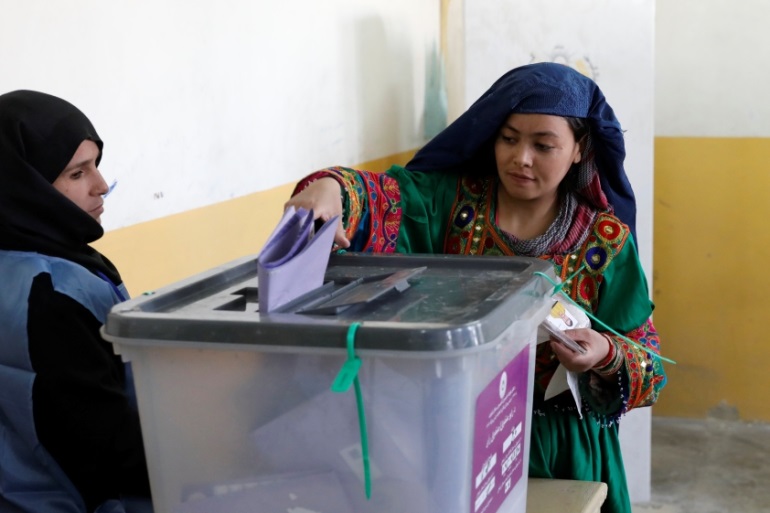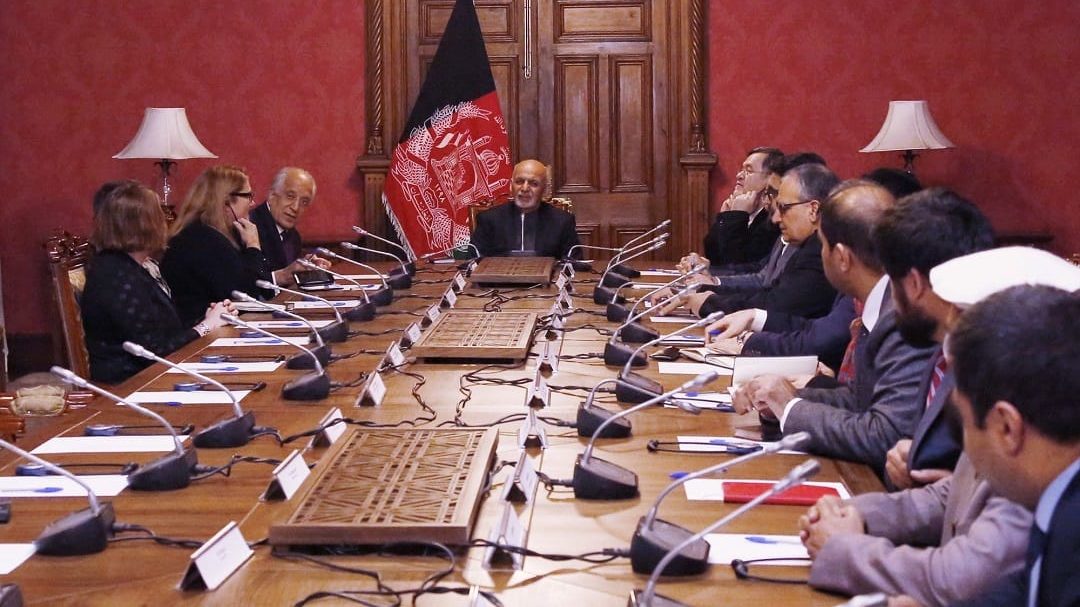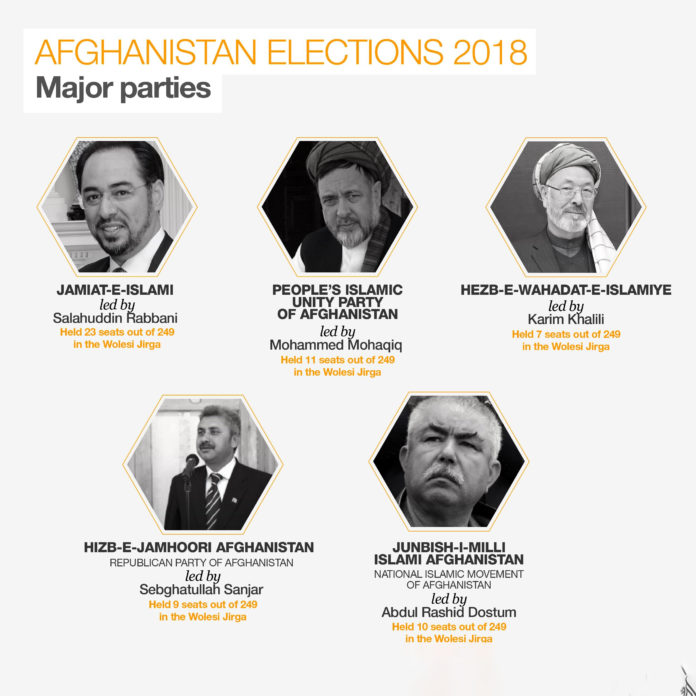Afghanistan is trying to recover from the impact of its violence soaked parliamentary elections, marred by boycott appeal by Taliban, suicide attacks, electoral inefficiencies, etc. The voting process was extended by a day to have face-saving voter turnout figures. During election days, over 100 persons lost their lives due to violence and more than 30 percent polling stations did not open due to security reasons. There was hours of delay in opening of remaining polling stations. The Elections were held three years behind the schedule. Independent Elections Commission Chairman Abdul Badi Sayat said more than 3 million people out of 8.8 million registered voters cast their ballots. But the actual figures were much lower. Reportedly, the biggest turnout was in Kabul and the lowest in the southern Uruzgan province. Polling on October 21 continued in 401 voting centres, including 45 in Kabul. The results of the polling will not be released before mid-November and final results will not be out until December. The US-backed government is rife with corruption, and the Afghan people did not expect the elections to be fair. The first parliamentary elections since 2010 were held against a backdrop of near-daily attacks by the Taliban, who have seized nearly half the country and have repeatedly refused offers to formally negotiate with the Kabul government.
Associated Press reported that officials at polling stations struggled with voter registration and a new biometric system that was aimed at stemming fraud but instead created enormous confusion because many of those trained on the system did not show up for work. The biometric machines arrived just a month before polls and there was no time to do field testing. The UN Mission in Afghanistan praised those who had made an effort to vote despite the technical issues, many of whom waited in long lines for hours as polling stations remained open late. “Those eligible voters who were not able to cast their vote, due to technical issues, deserve the right to vote,” it said in a statement.
The Taliban had vowed to attack the election, and on the first day of polling and at least 36 people were killed in nearly 200 attacks, including 27 civilians, according to Deputy Interior Minister Akhtar Mohammed Ibrahimi. He said security forces killed 31 insurgents in gun battles. On second day, a roadside bomb in the eastern Nangarhar province struck a vehicle filled with civilians, killing 11 people, including six children. No one immediately claimed the attack. Afghan civilians are often killed by roadside bombs intended to target security forces.

Such discredited elections in the past have not contributed to the wellbeing of the Afghan people, this latest botched up effort is not likely to do anything better. Afghan peace process continues to be in the wilderness, directionless and purposeless. The spiralling security issues have become an accepted norm.
In a recent insider attack in Kandahar, the governor, police and intelligence chiefs were shot dead. The actual target, top American commander in Afghanistan, General Austin Miller escaped narrowly while two of his elite guards died. Adding to the tension, the US has held quiet negotiations with the Taliban, blindsiding the Afghan president. And in a significant departure from its usual stance, Pakistan has demanded that the occupation forces should stay in Afghanistan till the country is stabilized. One wonders whether extension in troops’ stay would bring stability or such presence itself is the leading cause of pervasive instability.
Though everyone talks about an Afghan-led, Afghan-owned Compelling peace process, American position in terms of politico-financial clout and military prowess makes it impossible for any Afghan faction, including the Afghan government, to negotiate a sustainable peace agreement without involving the US guaran-tees. An Afghan led peace process is a fallacy and it is America’s responsibility to deliver a peaceful Afghanistan before their departure, or a formalised arrangement with Taliban to stick around. Notwithstanding this, the Taliban leadership has indicated that it would continue to have discussions with the new US Special Envoy Zalmay Khalilzad—a hawkish diplomat who was a former US ambassador to Afghanistan.
Commenting on first round of talks with Khalilzad at the Doha office, Taliban Spokesperson Zabiullah Mujahid said: “Both sides spoke (for) an end to the occupation and a peaceful solution to the Afghan issue (and) agreed to continue meeting in the future”. Though the diplomat is known for inflammatory views on near Pakistan’s role in the region, if he follows a pragmatic approach, he may be able to untangle a negotiating stalemate in Afghanistan. Nevertheless, both sides will have to make substantial concessions for the talks to succeed.
This development could accelerate multi-channel diplomatic engagement between the combatants. A publicly acknowledged rendezvous between a US envoy and the Afghan Taliban is an indication that the US side is, at long last, willing to acknowledge the political ground realities and retool the military balance of power in Afghanistan.
There is no clarity about the methodology that Khalilzad could follow; however, stalling this initiative may not an option as it could throw Afghanistan and the region into fresh chaos at a time when the political world order is confronting unparalleled stresses. While guarded buoyancy may be in order, it must be viewed in the context of a long history of broken promises and deliberate derailing of earlier such initiatives by the US.
The undercutting factor is that Americans do not wish to depart and to justify their presence Afghanistan must remain volatile, and hence a predetermined state of chaos is being sustained. And in this context, there is a method in madness manifesting in multiple changing of hands of urban town-ships between Taliban and the occupation forces. First the Afghan National Defence Forces (ANDF) lose territory to the Taliban, then they cry for help, upon this contingent of occupation forces move in retake the territory and assign it to ANDF, for losing it to Taliban for another time they cycle is repeated ad nauseam. Each such cycle rein- forces the perception that the ANDF cannot stand on its own feet, and it is the occupation forces which could deliver on peacekeeping so they must stay on. And no one from the US or Afghan government side even talks about controlling rural Afghanistan any more.
A peace arrangement with the Taliban could entail difficult decisions on a future role of the US military garrison in Afghanistan. A number of senior Afghan politicians have emphasized termination or rewriting of the Bilateral Security Agreement (BSA) with America and NATO. The sticky point is that the US wants to retain two bases in Afghanistan which is not acceptable to the Taliban. Taliban continue to demand a complete withdrawal.
Above all President Trump is in an indecent haste, and middle order leadership in Pentagon and State Department is fearful that if the peace process does not pick up the desired pace, Trump may take some erratic decision like, sending in more troops or an abrupt withdrawal.

If Khalilzad has the full presidential support, he could bring about a workable political settlement between the US, Afghan government and Taliban. However, the problem with a presidential support is that it is always on the tenterhook, ready for withdrawal on the slightest pretext. One thing is obvious, Americans are eager to cover substantial ground before the upcoming Afghan presidential elections and propel a future president who could go along with the understanding between the Afghan Taliban and the US. For this kind of arrangement, Americans are also showcasing meetings between the Afghan government and Taliban.
The Taliban also recognise that a potential window for a peace deal, backed by regional and international powers, may not remain open for an indefinite time. For Pakistan the challenge remains delivering the Taliban to the negotiation table in exchange for man-aging strained ties with the US. And Pakistan has gone out of the way to do this. Yet, a steady approach and common-sense diplomacy are needed form the US side otherwise a workable Taliban-US settlement may not be proverbially “around the corner”.
Khalilzad’s trip started and ended in Afghanistan and he travelled to Pakistan, the United Arab Emirates, Saudi Arabia and Qatar before returning to Kabul. But continued fighting has raised questions about the viability of the US strategy to end the war, which for the past year has focused on forcing the militants to the negotiating table, largely via more air strikes and arm-twisting Pakistan. While the Afghan presidential election is around the corner, Americans continue committing the same mistakes over and over again, while expecting different results.




